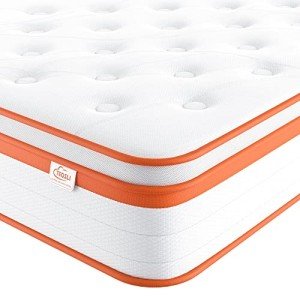Exploring the Benefits and Features of Memory Foam Mattresses: A Comprehensive Guide
In the last few years, memory foam mattresses have actually risen in popularity, transforming the method individuals believe about sleep comfort. Understood for their unique residential or commercial properties that offer assistance and decrease motion transfer, these mattresses have actually become a staple in numerous families. This post explores the world of memory foam mattresses, exploring their features, benefits, and factors to consider when purchasing one.
What is a Memory Foam Mattress?
Memory foam, or viscoelastic foam, is a kind of polyurethane foam that is delicate to temperature level and pressure. Initially developed by NASA for its crash protection capability, it has actually discovered its way into the customer market mainly in the type of mattresses and pillows.
Secret Features of Memory Foam Mattresses
- Conformity: Memory foam easily conforms to the body's shape, supplying tailored support.
- Temperature Sensitivity: It softens when warm and returns to its initial shape once the pressure is launched.
- Motion Isolation: The foam takes in motion, making it an exceptional choice for couples.
- Toughness: Generally, memory foam mattresses have a longer life-span compared to conventional spring mattresses.
Benefits of Sleeping on Memory Foam
1. Relief of Pressure Points
Memory foam mattresses excel in their capability to distribute body weight uniformly. This assists relieve pressure on sensitive locations such as the hips and shoulders, reducing the threat of discomfort and pain throughout sleep.
2. Enhanced Spinal Alignment
These mattresses promote correct back alignment, which is essential for a restful night's sleep. The supportive nature of memory foam assists keep the spine in a neutral position, making it an excellent alternative for those struggling with back issues.
3. Minimized Motion Transfer
For people who share a bed, the capability of memory foam to soak up movement can substantially improve sleep quality. Breathable Memory Foam Mattress avoids disturbances brought on by a partner moving throughout the night, which is a common grievance with traditional spring mattresses.
4. Hypoallergenic Properties
Memory foam is resistant to allergen and allergens, making it a suitable option for allergic reaction patients. The thick structure of the foam avoids many allergens from building up, promoting a healthier sleeping environment.
5. Range of Options
Memory foam mattresses come in different types, consisting of gel-infused, plant-based, and conventional memory foam. This variety allows consumers to choose a mattress that best fits their individual choices and needs.
Factors to consider Before Purchasing a Memory Foam Mattress
Although memory foam mattresses offer numerous advantages, potential buyers should consider the following elements:
1. Firmness Levels
Memory foam mattresses typically are available in a series of firmness levels. It's essential to select a firmness that lines up with your sleeping position:
- Side Sleepers: Benefit from a softer mattress that cushions the shoulders and hips.
- Back Sleepers: Require a medium-firm mattress for optimal back alignment.
- Stomach Sleepers: Should select a firmer mattress to prevent the spine from bending unnaturally.
2. Thickness
The density of a memory foam mattress can affect performance. A 10-12 inch density is normally suggested for ideal support and convenience.
3. Heat Retention
Some memory foam mattresses can maintain body heat, making them feel warmer than other types. To resolve this, think about gel-infused alternatives or those with cooling innovations.
4. Warranty and Trial Period
Getting a mattress is a considerable investment. Look for stores that offer generous trial periods and service warranties, permitting you to test the mattress and ensure it fulfills your requirements.
5. Price Range
Memory foam mattresses can vary extensively in price, influenced by aspects like brand name credibility, products utilized, and additional functions. It's important to research and find a balance between quality and budget plan.
Regularly Asked Questions (FAQs)
Q1: How long does a memory foam mattress last?
A: Typically, a high-quality memory foam mattress can last in between 7 to 10 years, depending upon usage and care.
Q2: Can I utilize a routine bed frame with a memory foam mattress?
A: Yes, memory foam mattresses can be used on different bed frames, including box springs, slatted frames, and adjustable bases.
Q3: Are memory foam mattresses safe for children?
A: Yes, memory foam mattresses are safe for children as long as they fulfill safety standards and accreditations. Look for GREENGUARD Gold certification for low emissions.
Q4: How do I care for my memory foam mattress?
A: Regularly turn your mattress to promote even wear, and utilize a protective cover to prevent stains and damage. Spot clean as required, and prevent using harsh chemicals.
Q5: Can memory foam mattresses be turned?
A: Most memory foam mattresses are developed to be one-sided and need to not be turned. However, Supportive Memory Foam Mattress can be turned to extend their life-span.
A journey to a memory foam mattress store can be an enlightening experience, providing ample insights into sleep comfort. With a myriad of options offered and numerous advantages to consider, it's important for buyers to examine their needs thoroughly. By comprehending the advantages, essential features, and factors to consider before making a purchase, consumers can make an informed decision to ensure relaxing and revitalizing sleep. As sleep plays a vital function in overall health and well-being, buying a quality memory foam mattress might be one of the most significant choices one makes for their sleep health.

